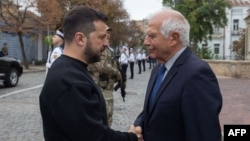The European Union’s foreign policy chief Josep Borrell urged U.S. lawmakers Sunday to reconsider their decision to strip financial support for Ukraine from a stopgap budget bill Congress passed Saturday to halt a federal government shutdown.
The legislation to keep the federal government running until Nov. 17 dropped additional aid to Ukraine, a White House priority opposed by a growing number of Republican lawmakers.
Speaking in Kyiv after meeting with Ukrainian President Volodymyr Zelenskyy, Borrell said European officials were surprised by the last-minute decision in Washington and pledged the 27-nation European bloc would continue helping Ukraine’s fight against Russian aggression.
“We are facing an existential threat. Ukrainians are fighting with all their courage and capacities, and if we want them to be successful, then you have to provide them with better arms, and quicker,” he stressed.
Borrell expressed hope that the U.S. Congress’ move to exclude Ukraine aid from its temporary government funding is not a definitive decision and that Ukraine will continue having the support of the U.S.
Andriy Yermak, the head of Ukraine’s presidential office, expressed confidence that Washington will uphold its military aid to Ukraine.
“All of Ukraine’s key partners are determined to support our country until its victory in this war,” he wrote on the messaging app Telegram.
In a speech Sunday, Zelenskyy said that nothing would weaken his country's fight against Russia.
Nevertheless, the omission of additional Ukrainian aid from the Washington funding bill has alarmed Kyiv, which relies heavily on Western financial support and military equipment in its counteroffensive against Russia’s ongoing invasion.
U.S. President Joe Biden pressed Sunday for congressional Republicans to back a bill to provide more aid to Ukraine, saying he was "sick and tired" of the political brinkmanship that nearly led to a government shutdown.
"We cannot under any circumstances allow America’s support for Ukraine to be interrupted. I fully expect the speaker to keep his commitment to secure the passage and support needed to help Ukraine as they defend themselves against aggression and brutality," he told reporters at the White House.
Many lawmakers, however, acknowledge that winning approval for Ukraine assistance in Congress is growing more difficult as the war between Russia and Ukraine grinds on.
Voting in the House this past week pointed to potential trouble ahead. Nearly half of House Republicans voted to strip $300 million from a defense spending bill to train Ukrainian soldiers and purchase weapons. The money later was approved separately, but opponents of Ukraine support celebrated their growing numbers.
Ukraine funding dissent
Earlier Sunday, in Slovakia, the winner of parliamentary elections held over the weekend was poised to begin coalition talks to form a government opposing the EU’s military aid for Ukraine.
Robert Fico’s party slogan “Not a single round" for neighboring Ukraine resonated in Slovakia, a nation of 5.5 million.
"We are not changing that we are prepared to help Ukraine in a humanitarian way," said the pro-Russia Fico, whom analysts consider to be inspired by Hungary's nationalist Prime Minister Viktor Orban, an opponent of the EU’s commitment in arming Ukraine.
Fico said Slovakia, a NATO member, has bigger problems than the Ukraine issue, including energy prices and living costs, but added his SMER-SSD party would do everything possible to start peace talks.
Earlier, the British defense ministry said in its daily intelligence update about Ukraine that “apparently leaked” documents from Russia’s finance ministry “suggest” that Russia is prepared to greatly increase its defense spending.
The proposed 2024 Russian defense ministry budget is about $110 billion, a 68% increase over 2023, according to the documents.
The British defense ministry said spending at that level through 2024 would likely be at the expense of the wider economy.
These numbers, the ministry said, suggest that Russia “is preparing for multiple further years of fighting in Ukraine.”
In an address marking the anniversary of the annexation a year ago of the Donetsk, Luhansk, Zaporizhzhia and Kherson regions, Russian President Vladimir Putin said on Friday that Russia would enlist 130,000 men for compulsory military service beginning Sunday in most regions of the country, including in the annexed regions of Ukraine as part of its twice-yearly military conscription campaign.
The conscripts are at least 18 years old, while the maximum age would be extended from 27 to 30.
Some information for this report came from Reuters and The Associated Press.





